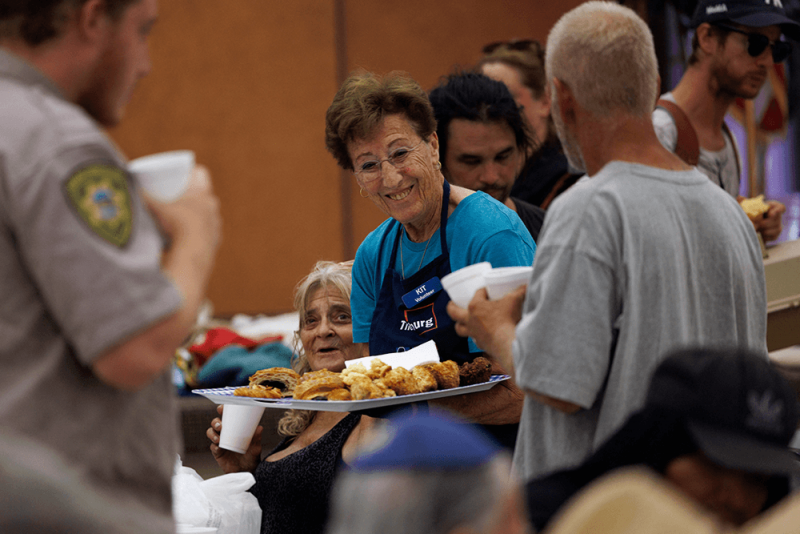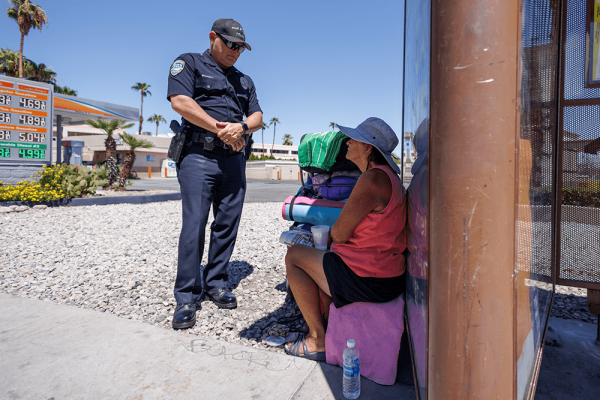Palm Springs, Calif., long known as a desert playground for the rich and famous of Los Angeles, has enacted a number of progressive measures to address homelessness.
Then in July, the all-Democratic city council passed a ban on sleeping on public property that will expand police authority to arrest the unhoused, underscoring how even liberal cities have lost patience as the homeless crisis persists.
Other cities have grown even more emboldened by a June 28 ruling from the conservative-majority Supreme Court that camping bans are constitutional.
Since then, 12 California cities or counties have passed camping bans while another nine are considering them or have already given initial approval, according to the National Homelessness Law Center.
Many of those cities cited the Supreme Court decision as they passed new ordinances to evict unhoused people from public view.
With soaring rents and an acute housing shortage, California has an estimated 180,000 homeless people even though it has spent more than $20 billion on housing and homelessness programs since the 2018-19 fiscal year.
Margot Kushel, a professor of medicine at the University of California, San Francisco, and co-author of a 2023 report on the state’s homelessness, calls the police crackdowns counterproductive.
Having a criminal record impedes a homeless person’s chance at getting a job, and the distrust it generates reduces homeless cooperation with police, Kushel said. Scattering them strains their access to outreach workers.
“We need housing. We need subsidies. We need not just affordable housing, but we need deeply affordable housing,” Kushel said.
Camping bans
Palm Springs, a city of 45,000 about 100 miles east of Los Angeles, stopped just short of exercising all the authority granted to cities in Grants Pass v. Johnson. The new ordinance instead complies with a previous federal court ruling and will prevent law enforcement from enforcing the ban when emergency shelter space is full.
Its new law won’t take effect until 85 temporary housing units are completed later this year.
With a homeless population that advocates estimate at 500, Palm Springs previously enacted rental assistance for people in danger of losing their homes, set aside a quarter of tax revenue from vacation rentals for affordable housing, and opened a 50-bed shelter in March.
California jurisdictions received further guidance when Democratic Gov. Gavin Newsom on July 25 issued an executive order directing state agencies to urgently address homeless encampments and urged cities to adopt a similar posture.
240906-palmsprings2.png

Meanwhile five local entities, including the city and county of Los Angeles, have passed measures or issued statements resisting police crackdowns or have approved sanctioned camping spaces, the National Homelessness Law Center said.
Outside California another 25 cities in 15 states have passed or are considering camping bans, the center said.
‘Enough is enough’
Palm Springs Police Chief Andrew Mills shares the perspective that police cannot solve the problem and says he advocates for compassion.
But “we have to be able to say enough is enough as a community and as a country,” Mills said from the streets on a recent day when the high temperature reached 110 Fahrenheit. “We needed some kind of leverage to say you’re not going to do this in our city.”
Mills said police will give homeless people three options: take help by entering a shelter; accept the city’s offer of a free bus, train, or plane ticket home where family can take them in; or go to jail.
At the United Methodist Church, where the social services group Well in the Desert serves 250 free meals a day, one homeless man said homeless people are routinely harassed and he has been arrested for pushing a shopping cart and loitering.
“They want us out of sight. That’s the end point,” said Travis Rogers, 60, who said he became homeless after experiencing extreme grief at the death of his only son from brain cancer five years ago. “I just wish the city council or this new chief of police would actually talk to us instead of just passing all these ordinances.”
Eve Garrow, a lawyer with the American Civil Liberties Union, says cities rushing to pass laws are in a “race to the bottom.”
“They’re not controlling the fact that wages have stagnated over the last 20 or 30 years and housing prices have skyrocketed,” Garrow said.
Tina Allgood, 53, another person at the church, said he lives in fear of the police while he continues to look for a job and permanent housing.
“Don’t be so hard on us,” Allgood said. “You know, don’t make us run from you. Make us run to you.”
Got something to say about what you're reading? We value your feedback!






